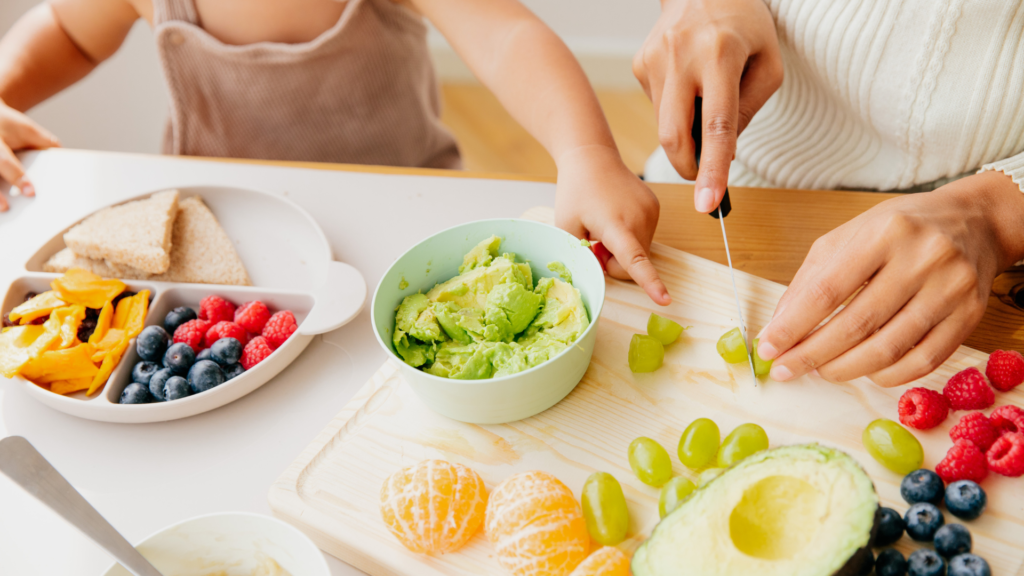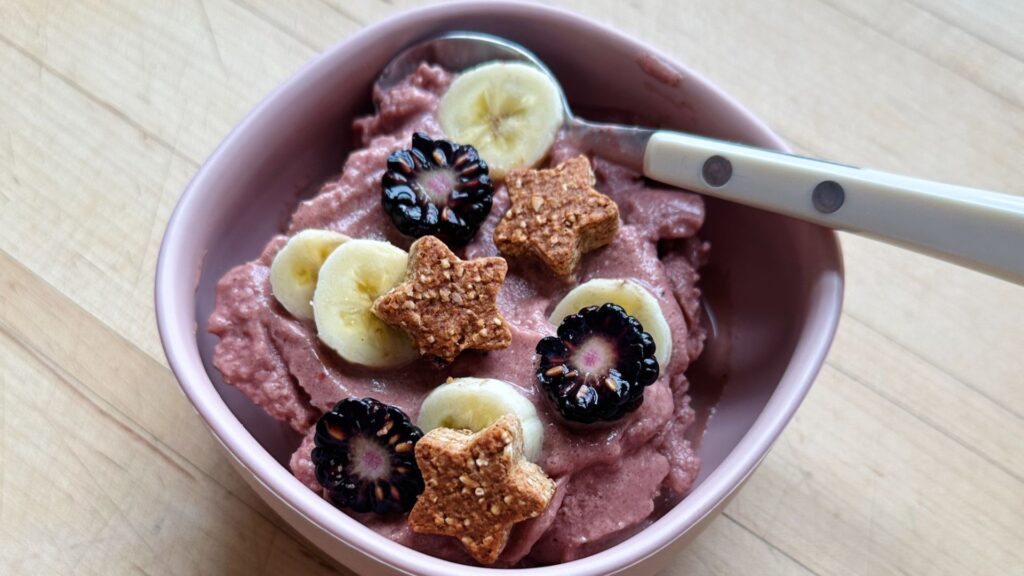5 Steps to Planning a Vegetarian Diet for Your Child
*Disclaimer: this article is not meant to be individual medical/nutrition advice but for education purposes only. Each child’s nutritional needs are different.
to veg or not to veg?
Being a parent means making decisions. Decisions about EVERYTHING. You may not even realize when you’re doing it, but you are, literally 24 hours a day. Some decisions are trivial — “Should I change her wet diaper (at 4am) and risk fully waking her, or do I wait until 7am”? And some are big — “What foods do I want to feed my baby?”
Making decisions about the type of food we offer to our babies is quite personal. Remember that no matter what path you take, vegetarian or otherwise, nothing is set in stone. You can always make changes in response to your own ever-changing breadth of knowledge or ethics or just for the sake of your own sanity and need for convenience.
Plant based nutrition is becoming increasingly mainstream for adults. If this is your preferred way of eating then it’s natural that you may want this for your baby as well.
Keep in mind that kids are not tiny adults. While the nutritional intake of adults is ‘ important’ as we age, to prevent disease and maintain a strong body and mind; when it comes to babies and toddlers who are growing and developing — nutrition is ‘exceedingly CRITICAL’.
There is a short window of time during the first 2-3yrs of life when your baby’s brain is growing, developing and making new connections. The good news is that babies can meet their nutritional requirements with a vegetarian diet (if that’s what you choose). It does however require thoughtful planning.
This article will help you with planning a vegetarian diet for your child in 5 simple steps.

1. Know which nutrients are worthy of special attention
- Vitamin B12
- Iron
- Zinc
- Vit D
- Omega 3 DHA
- Choline
- Calcium
- Protein
There’s no reason to automatically resort to supplements or protein powders. Real food is the best way to get these nutrients, either from whole food or convenient pre-packaged puree pouches. That being said, sometimes supplements are necessary.
I suggest asking your health care provider if you think you may need supplements.
Why do these particular nutrients need attention?
VITAMIN B12
This nutrient is very important to highlight first because it’s only found in animal products, with very few exceptions.
The vitamin B12 content of breastmilk is highly dependent on Mom’s diet. If you follow a vegan diet and breastfeed, you (Mom) will need vitamin B12 supplementation to prevent vitamin B12 deficiency in your baby. I recommend asking your health care provider if you or your kiddo needs a vitamin B12 supplement.
IRON
Around 6 months of age, the iron that babies have stored up in their bodies becomes diminished. Knowing this, you likely aren’t surprised that it’s super important to focus on iron-rich foods. This will be especially true for babies who are not getting meat or iron fortified infant cereal.
Babies with a vegetarian diet need 50% more iron than babies who get iron from meat (1). Plus, the iron from plant based food is not absorbed by the body as well as iron from meat. Vitamin C does help with the absorption of iron from plant based foods, so it’s a good idea to offer food sources of vitamin C along with the iron rich foods above.
ZINC
If you and your little one embrace a vegan/vegetarian lifestyle, zinc is even more important as you are at a higher risk of deficiency. Vegetarians can require as much as 50% more zinc because certain acids in plant foods can bind to the available zinc and in turn interfere with its absorption (2). A quick hack for home: soak beans or seeds in water overnight to increase the bioavailability of zinc!
Zinc is one of the nutrients that our body can’t make or store. It’s why getting your zinc from whole foods is so important. Breast milk provides an adequate amount of zinc until about 6 months of age –so after that, make sure you offer foods rich in this amazing nutrient.
VITAMIN D
Vitamin D is actually a nutrient that everyone (vegetarian or otherwise ) needs to consider. It’s difficult to find in food, but even more difficult for those who don’t eat dairy, eggs or fish. It’s generally recommended that all kids take a 400 IU vitamin D supplement daily. Did you know that certain mushrooms are a source of vitamin D? Examples are maitake and shiitake mushrooms that have been exposed to UV light or sunshine (3).
CHOLINE
The main sources of choline are from animal foods, which is why vegetarians and vegans typically need to put special effort into finding plant-based sources. You’re not alone if you haven’t heard of choline. It’s hardly a well-known nutrient. But it’s hugely important! In fact, it’s been shown to be critical to brain development in the first 2 years of life (4,5).
2. Understand how lacto-ovo-pescetarian or vegan choices impact nutrition
To get started, ask yourself if you are planning to offer dairy (lacto), eggs (ovo) and/or fish (pescatarian).
See the guide below to learn about which of the above mentioned nutrients are present and which are absent in dairy, eggs and fish. You’ll notice that they contain most of these nutrients.
On the flip side, a vegan diet for babies is more tricky and should be approached with careful attention to all the nutrients highlighted in this article, and guided by a health professional. Supplements like vitamin B12 are likely to be needed if you are interested in a vegan diet for your kiddo.
Here’s a guide for the tables below:
✓ = typically present
X = negligible amount present
empty grey box = may or may not be present

3. Discover plant-based foods that are rich in each of these important nutrients
Here’s some examples to choose from (there are more of course!):
Vitamin B12
- chlorella (freshwater algae)
- nori seaweed
- nutritional yeast
- fortified milk alternatives
- some fortified cereals
- soy infant formula
Iron
- beans
- peas
- lentils
- spinach
- tofu
- nuts & seeds
- iron-fortified cereals
- soy infant formula
Zinc
- beans
- pumpkin seeds
- spinach
- wheat germ
- peas
- lentils
- nuts & seeds
- soy infant formula
Vitamin D
- maitake and shiitake mushrooms
- vegan vitamin D supplement
Calcium
- dark green vegetables
- almond butter
- tofu
- edamame
- tahini
- fortified milk alternatives
Omega 3 DHA
- kelp
- algal oil
- vegan DHA supplement
Choline
- beans
- quinoa
- sunflower seed butter
- green beans
- peas
- wheat germ
Protein
- beans
- lentils
- peas
- nuts & seeds
- tofu
- soy yogurt & cheese
- milk alternatives

4. Make a personalized list of which foods YOU will offer to YOUR kiddo
Let’s be honest, kids will not accept all foods right off the bat. Making a personalized list of foods that appeal to you and your family is key. Focus on these foods when you can, keeping variety in mind as a goal. Expand the list gradually and mix with foods they already love.
Here’s an example of a personalized list using foods selected from the above options:
- nori seaweed (vitamin B12)
- fortified unsweetened soy milk (vitamin B12, calcium, zinc, protein)
- beans (iron, zinc, protein)
- spinach (calcium, iron)
- sunflower seed butter (choline)
- green beans (choline)
5. Find ‘convenience’ foods that also provide these nutrients
We all know that making homemade baby food is time consuming and not always possible. As a mom, I’ve had days when I felt deeply guilty about this, and days when I was able to recognize my limits and embrace convenience. Finding ways to make life easier is a skill and letting go of any preconceived ideals is WINNING.
When my kids were babies, there wasn’t a convenient option of a pre-packaged pouch that had iron, omega 3 DHA, choline, vit B12, zinc etc. But now there is.
Flip the package of any Cerebelly pouch and you’ll find these nutrients and more. My kids are a little older now but still benefit from Cerebelly purees added to their food.

Key takeaways
- Healthy vegetarian diets are possible for kids but require careful planning to ensure all nutrients are covered (see the 5 steps above to get started).
- Vegan diets for kids should be guided by a health professional.
- Keep in mind that sometimes vegetarian/vegan diets can generally be low in fat. Kids need dietary fat for brain development and growth. Make sure to add sources of fat if needed.
- Feeding our kids should be fun and comfortable. You should always do what makes you feel good as a parent/caregiver. That means how you choose to feed your kiddo will absolutely be different than the next parent. You do you.
References:
- National Institutes of Health on Iron. https://ods.od.nih.gov/factsheets/Iron-HealthProfessional/
- National Institutes of Health on Zinc. https://ods.od.nih.gov/factsheets/Zinc-HealthProfessional/
- Keegan RJH. Photobiology of Vitamin D in Mushrooms and it’s Bioavailability in Humans. Dermato-Endocrinology 2013; 5:1.
- Georgieff MK. Nutrition and the Developing Brain: Nutrient Priorities and Measurement. Am J Clin Nutr 2007;85(suppl):614S–20S.
- Derbyshire E. Choline, Neurological Development and Brain Function: A Systematic Review Focusing on the First 1000 Days. Nutrients 2020;12:1731.
About
the author
Stacey Segal BScA, MSc, RD

Stacey is a pediatric dietitian and a mom of two little eaters. Her career has been dedicated to nourishing babies, toddlers and kids. She’s a staff dietitian at The Hospital for Sick Children, Toronto, specializing in neuroscience. Stacey is also the founder of the Prenatal and Pediatric Nutrition Clinic at GSH Medical, and a nutrition writer for AboutKidsHealth website. Being a mom herself, she has experienced the challenges that come with feeding kids. She’s passionate about helping families raise well nourished kids right from the start!
Have more questions? Send us an email at support@cerebelly.com and we will be sure to get back to you!



